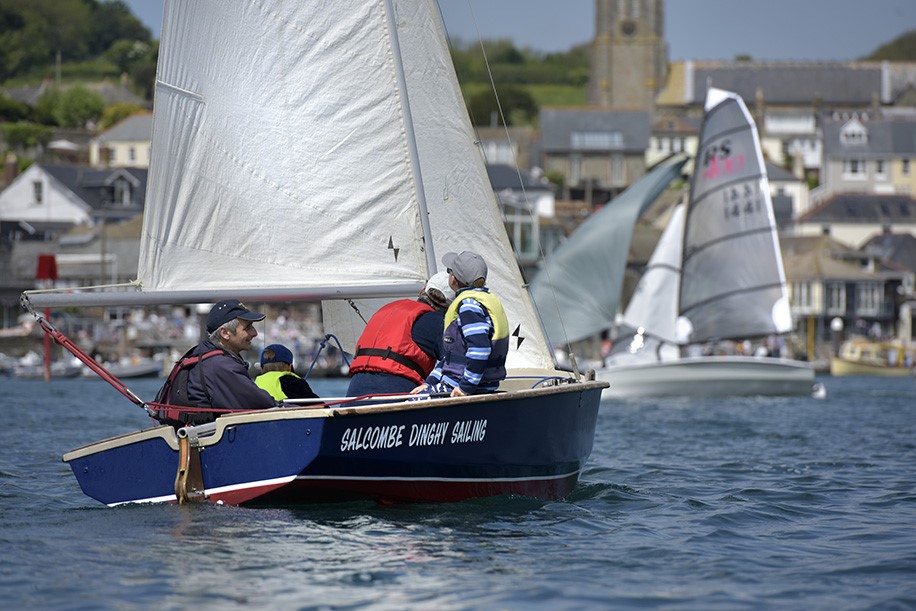Salcombe sailing: A complete guide to sailing in Salcombe
Sailing is by far one of the most popular pastimes in Salcombe with both visitors and locals alike. Salcombe...

For many sailors, the pastime is in their blood. Some South Devon locals can’t even remember how they learnt to sail, so gradual and natural was their introduction to life on the water.
But for those of us without sailing parents or friends, where can we get the first-time sailing tips we need? How do we arrange going sailing for the first time, what equipment do we need to bring and how should we dress? Many of us don’t even know which questions to ask, and if we did, being Brits we’d probably be embarrassed to reveal our ignorance by asking!
So I got in touch with Ross and Zoe Crook from Salcombe Dinghy Sailing for some first time sailing tips. My mission was to ask all the embarrassing ‘newbie’ questions I could think of – luckily, as I’ve never sailed in my life, it wasn’t a difficult brief!
As the RYA Chief Instructor at Salcombe Dinghy Sailing, Ross spends most of his working life on the water. And he’s passionate about helping others get their sea legs too.

Here’s how Ross answered my questions about going sailing for the first time.
Check out the Royal Yachting Association website. They have a list of clubs and centres in your area which may offer taster sessions to courses. Local Tourist Information Centres may also have the details of the clubs and centres in that town, along the coasts and also in land.
A question we get asked more than others. If you can commit time to sailing, it is much like other sports. The more you do the more confident and skilled you become. The more time on the tiller, the better. A beginner’s course can open the door to the world of sailing. Catch the bug and choose which journey you would like to take.
The most common thought is that it should be something small. Courses can be undertaken in both single and double handers. Single handers are designed ideally to be sailed by one adult. Double handers can be sailed with up to four persons depending on the boat setup.
Depending on which type of dinghy the course is being taken in will determine what is advisable to wear. For double handed vessels with an instructor on board, warm layers, a waterproof outer and some good sturdy shoes would do. Single handers where the student is being instructed to sailing by the instructor teaching them from a safety boat, full length wetsuits, wetsuit boots and a sailing-type smock are advisable.
Most centres would supply a buoyancy aid for the duration of your course.
After the basic skills of sailing have been mastered, the sport branches out in different directions. Your personal equipment may vary. A wetsuit for example, can be a costly first buy if you go for big brands. There are cheaper alternatives even stocked in supermarkets.
No reading is required before your first lesson. However, the internet has a vast amount of information from videos to books. It may be worth having a look for a start sailing handbook that would get you acquainted with some terminology.
Wear the appropriate clothing. Let someone ashore know what your plans are and when you expect to return. Sail in conditions which don’t exceed your own ability. Carry a mobile phone or Very High Frequency (VHF) radio. Know what to do in case of emergency – call 999 and ask for the coastguard.
If you want the best equipment and want to own a boat, then it can be expensive. Joining a local sailing club has the benefits that they may have boats available for you to use. There’s also the ability to crew for other members on their own boat.
There is a large secondhand dinghy market in the UK. The right dinghy can be bought with a bit of searching and usually for a lot less cost than a new one.
It is a sport that is as rewarding as it is challenging. I’m not going to make you into an Olympic sailor after your first course. We will provide you with the foundations to start and you can choose the path afterwards.
There are different types of sailing available – sailing out to sea, exploring the creeks, inland and coastal sailing. The beautiful setting.
So there you have it: armed with these first-time sailing tips, there’s nothing to stop you booking your first lesson. Salcombe Dinghy Sailing is a great first port of call, offering taster sessions, private tuition and RYA courses for adults and children.
Not only does Salcombe have helpful expert instructors like Zoe and Ross to help you get on the water, the area also provides a stunning coastline to explore, a mild microclimate and an extensive range of holiday accommodation within a stone’s throw of the water.
Sailing enthusiasts might also be interested in this Q&A about the Salcombe yawl with local sailor, ‘Scratch’ Hitchen.
Book your Salcombe holiday today.